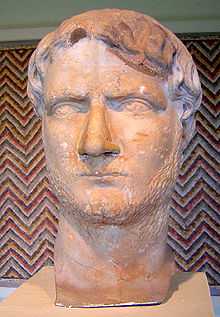253
This article is about the year 253. For the number, see 253 (number). For the novel by Geoff Ryman, see 253 (novel).
| Millennium: | 1st millennium |
|---|---|
| Centuries: | 2nd century – 3rd century – 4th century |
| Decades: | 220s 230s 240s – 250s – 260s 270s 280s |
| Years: | 250 251 252 – 253 – 254 255 256 |
| 253 by topic | |
| Politics | |
| State leaders – Sovereign states | |
| Birth and death categories | |
| Births – Deaths | |
| Establishment and disestablishment categories | |
| Establishments – Disestablishments | |
| Gregorian calendar | 253 CCLIII |
| Ab urbe condita | 1006 |
| Assyrian calendar | 5003 |
| Bengali calendar | −340 |
| Berber calendar | 1203 |
| Buddhist calendar | 797 |
| Burmese calendar | −385 |
| Byzantine calendar | 5761–5762 |
| Chinese calendar | 壬申年 (Water Monkey) 2949 or 2889 — to — 癸酉年 (Water Rooster) 2950 or 2890 |
| Coptic calendar | −31 – −30 |
| Discordian calendar | 1419 |
| Ethiopian calendar | 245–246 |
| Hebrew calendar | 4013–4014 |
| Hindu calendars | |
| - Vikram Samvat | 309–310 |
| - Shaka Samvat | 175–176 |
| - Kali Yuga | 3354–3355 |
| Holocene calendar | 10253 |
| Iranian calendar | 369 BP – 368 BP |
| Islamic calendar | 380 BH – 379 BH |
| Julian calendar | 253 CCLIII |
| Korean calendar | 2586 |
| Minguo calendar | 1659 before ROC 民前1659年 |
| Seleucid era | 564/565 AG |
| Thai solar calendar | 795–796 |
| Wikimedia Commons has media related to 253. |

Emperor Gallienus
Year 253 (CCLIII) was a common year starting on Saturday (link will display the full calendar) of the Julian calendar. At the time, it was known as the Year of the Consulship of Volusianus and Claudius (or, less frequently, year 1006 Ab urbe condita). The denomination 253 for this year has been used since the early medieval period, when the Anno Domini calendar era became the prevalent method in Europe for naming years.
Events
By place
Roman Empire
- Period of the Thirty Tyrants in the Roman empire. The legions who have campaigned against the Goths on the Danube elect Marcus Aemilius Aemilianus as new emperor. He advances on Rome along the Flaminian Way, to meet his opponent emperor Trebonianus Gallus and his son Volusianus. For the most part, generals in the border regions are proclaimed emperor by their armies to halt the invasion of Germanic tribes.
- Aemilianus is proclaimed "enemy of the State" by the Roman Senate. Trebonianus Gallus is defeated at Interamna Nahars (Umbria), he flees with Volusianus to the north, but at Foligno they are killed by their own troops.
- Aemilianus rules for 3 months the Roman Empire, he promise to fight in Thrace and goes to war against Persia. The Senate gives him the rank of Pontifex Maximus.
- Aemilianus is murdered at Spoletium and Publius Valerianus, age 60, is recognised as new emperor by the Rhine legions. He gives his son Publius Licinius Egnatius Gallienus the title Augustus. Valerianus I dispatches him to the Danube where the Goths are violating the treaty signed with Rome and invade Moesia.
- Valerianus I splits the Roman Empire in two; Gallienus taking control of the West and his father ruling the East, where he faced the Persian threat.
- Battle of Barbalissos: King Shapur I, defeats the Roman army (70,000 men) under Valerianus I at Barbalissos in Syria.
By topic
Religion
- Pope Cornelius is sent into exile.
- June 25 – Pope Lucius I succeeds Pope Cornelius as the 22nd pope.
- Lucius is arrested almost immediately following his election and also exiled.
Births
Deaths
- Pope Cornelius
- Aemilianus, Roman emperor
- Trebonianus Gallus, Roman emperor
- Volusianus, Roman emperor
- Saint Babylas, Patriarch of Antioch
- Fei Yi, general-in-chief of the Shu Kingdom
- Zhuge Ke, son of Zhuge Jin, nephew of Zhuge Liang, officer of the Wu Kingdom (b. 203)
- Sun He, son of Sun Quan
- Ehe Shaoge, a general of Qiang